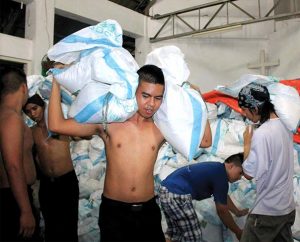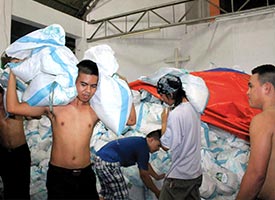By Adriane Heins
“When we see our brothers and sisters in the household of faith who are suffering, we have an opportunity to do something, to do some good,” encourages the Rev. Ross Johnson, co-director of LCMS Disaster Response.
He’s recalling Paul’s admonition to the Galatians to “not grow weary of doing good … to those who are in the household of faith” (Gal. 6:9-10), especially after returning from two trips: one to the Philippines, where the LCMS’ disaster-grant dollars are already meeting the needs of those suffering from Typhoon Haiyan, and one to Colorado to survey the continued effects of September’s devastating flood.
The opportunity to “do good” is still massive, say both Johnson and the Rev. Michael Meyer, manager of LCMS Disaster Response.
Relief in Colorado
LCMS Disaster Response has already given some $500,000 in grants to the Rocky Mountain district and to congregations in the district. Mount Calvary Lutheran Church in Estes Park, Colo., received funds to help to provide transitional housing, make up for lost wages and assist families in getting back into their homes.
The Rev. Seth Clemmer, pastor of Mount Calvary, is grateful.
“The Synod’s [disaster response] grant has assisted in the relief and recovery process for many of Mount Calvary’s members, as well as our friends, neighbors and co-workers, giving our congregation opportunities to develop relationships with and offer the Lord’s mercy and peace to multiple people in our community,” said Clemmer.
Eternal Savior Lutheran Church in Lafayette, Colo., also received a grant — primarily to assist the people of Lyons, a community about 20 minutes northwest, whose residents have experienced E. coli-infected water and contaminated sewer lines since the flooding. Residents expect that it will still take several months before they can return home. Because of this, and although there is no LCMS church in Lyons, the grant provides extended transitional housing for those displaced families, since other organizations “only provide housing for two to three months,” explains Meyer.
Additionally, this month (January), Vicar Kevin Richter of Mount Calvary Lutheran Church, Brookings, S.D. — plans to lead a group of LCMS campus-ministry college-age students to the area to assist as volunteers. “It will be a years-long cleanup process,” Meyer admits.
In the Philippines
The people of the Philippines, meanwhile, continue to suffer following the Nov. 8 Typhoon Haiyan, which killed some 6,000 people and left 4 million displaced. Reports say nearly 2,000 people are still missing.

The LCMS’ mercy arm has already reached out with some $350,000 in funds. Of that, $100,000 was supplied to Lutheran World Relief in Baltimore, which shares a collaborative agreement with the LCMS. “Their work with providing shelter repair kits is essential,” says the Rev. Glenn Merritt, co-director of LCMS Disaster Response.
Other dollars — combined with some $90,000 from the Lutheran Church in the Philippines — funded an emergency grant to subsidize some 5,000 care packages, each providing the materials needed to feed and maintain proper hygiene for a family of eight for almost a week.
“The money is from the LCMS to the Lutheran Church in the Philippines, but they are taking ownership of assembling [the packages],” Johnson says. “They are purchasing the items needed from other islands and using the labor of Lutherans in those islands to do it. Pastors are distributing the care packages to their congregations and communities, blending mercy with the Gospel on the island of Leyte.”
But funds remain in high demand, especially since members of Lutheran congregations in the area have seen the loss of their livelihoods and “their homes destroyed. In one town, multiple families of the congregation are staying in the sanctuary, which also has substantial damage to it,” recalls Johnson. “The immediate need is for food and hygiene; the intermediate need will be working with the Lutheran Church in the Philippines to help with sustainability and rebuilding lost homes,” each of which costs from $1,000 to $1,500. “Laborers are plentiful in the Philippines. They have the resources on the other islands; what they need now is funds to be able to purchase the goods: cinder block and corrugated roofs.”
The amount of work ahead for the people in the Philippines is overwhelming, Johnson and Meyer say. But they have still another concern, one that’s close to their hearts: caring for the Lutheran pastors who are showing pastoral care to the Filipino people. Three stand out in their minds: the Rev. Antonio Reyes, the Rev. Nicolas Ranara and the Rev. Xavier James Palatoo.
“Pastor Nick has gone through unimaginable hardship, seeing his entire community destroyed and 5,000 people dead overnight,” recounts Johnson. “The community is destroyed. His congregation is homeless. He has gone through an incredible amount of shock. But he still has a great confession of faith. He has not given up his faith or trust in God.”
“It’s wonderful to see these pastors’ strong Christian witness despite the overwhelming damage they are experiencing,” Johnson says. “Pastor Palatoo’s parsonage was damaged. He and his wife and newborn child are sleeping under a canopy; the baby is under a net to try to prevent mosquito-borne diseases. He has a lot that he is mentally and emotionally juggling. But with Pastor Reyes and other pastors, they have all really rallied together to support their brothers and sisters on the island.”
Funds still needed
“Not all disasters are equal,” explains Meyer. “Some may produce a great desire to give, thanks be to God. Others, because they aren’t as flashy, may bring about fewer donations, even though the need is still there.”
All, however, require substantial funds to the Synod’s general disaster-response fund, allowing Meyer, Johnson and others to respond quickly and as needed.
“When you see a tornado, you see splintered wood and shattered windows … but the damage may only be for one city block,” says Johnson. “With the flooding in Colorado, the context is hard to pick up on, because miles of homes have each experienced tens of thousands of dollars of damage.
“We’ve had large grant requests come from congregations that we, sadly, had to significantly reduce by several hundred thousand dollars because the dollars simply weren’t there.”
“It’s why any dollar amount helps, no matter how big or small,” encourages Meyer. “Six thousand congregations and two-and-a-half million LCMS members can come together to do great things. What seems small to us — when we add it up over the entire LCMS — is an amazing and fantastic amount and can impact the lives of so many, allowing our congregations to respond with love, compassion, mercy and with the Gospel of Jesus Christ.”
While Meyer continues to monitor the cleanup efforts in Colorado, Johnson and Merritt are making tentative plans for a January trip back to the Philippines to meet with the church’s leadership.
“LCMS Disaster Response is working collaboratively with the Asia Pacific regional area staff and the leadership of the Lutheran Church in the Philippines to establish an action plan for future recovery and rebuilding efforts,” says Merritt.
To make a gift in support of the church’s relief and recovery efforts:
- Visit lcms.org/givenow/ disaster.
- Send checks payable to “The Lutheran Church—Missouri Synod” (with a memo line designating “LCMS Disaster Response”) to The Lutheran Church—Missouri Synod, P.O. Box 66861, St. Louis, MO 63166.
- Call toll-free 888-930-4438 (8:10 a.m. to 4:10 p.m. Central Time, Monday through Friday).
“If a brother or sister is poorly clothed and lacking in daily food, and one of you says to them, ‘Go in peace, be warmed and filled,’ without giving them the things needed for the body, what good is that?” Johnson says, reciting James 2:15-16. “We as Lutherans in the United States need to have more than just thoughts or warm feelings of concern. We need to see faith come alive in action.”
To watch a new video about the Synod’s disaster response in the Philippines, click here.
To read a related story, “LCMS Disaster Response by the numbers,” click here.
Adriane Heins is associate executive director for Strategic Communications for the LCMS.
